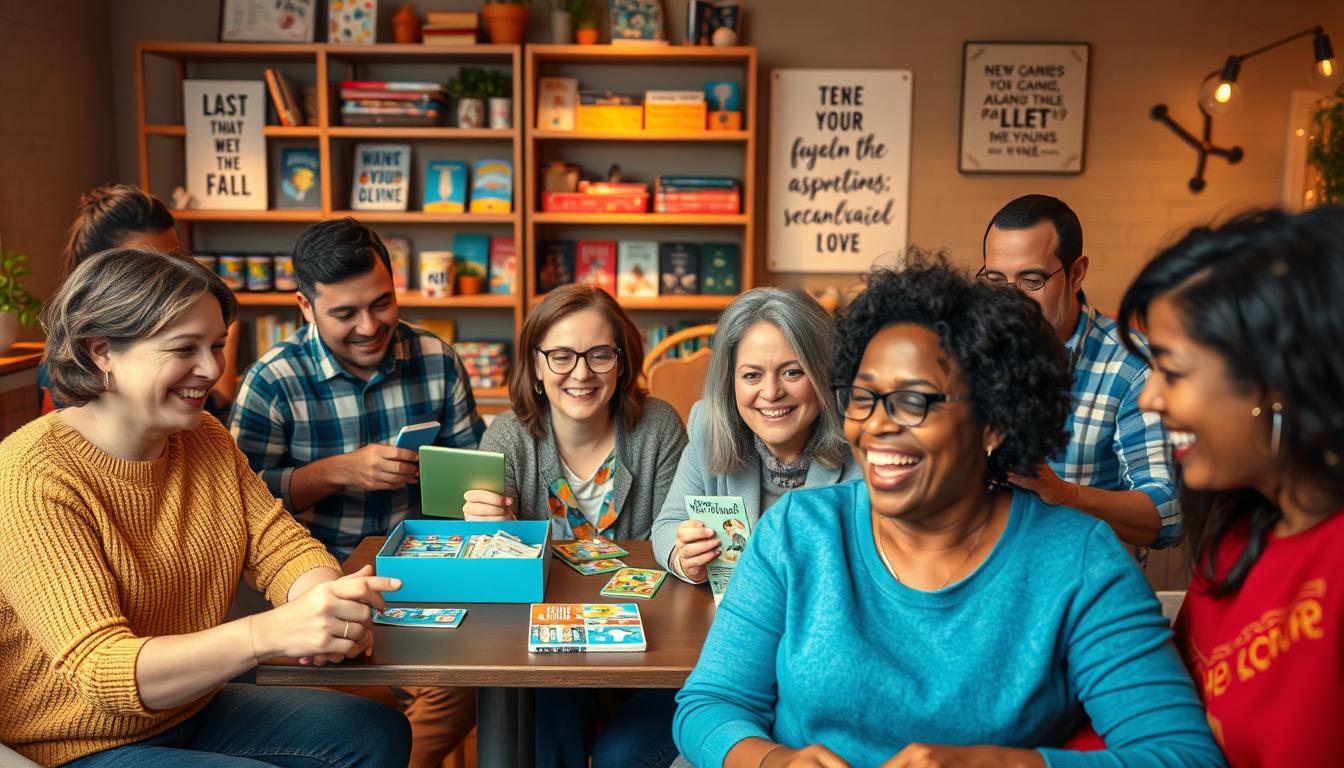Games to reactivate vocabulary and verbal fluency in adults feeling mentally blocked
Ever felt like some words just disappear when you need them? Many adults face this issue, making it hard to communicate. But, there’s a fun solution: playing games that boost your vocabulary and fluency.
These games are not just for fun. They help you learn new words and break through mental blocks. This way, you can express yourself better and enjoy the process.
Introduction to Mental Blocks and Language
Mental blocks are a big problem, especially when talking. They can come from stress and anxiety, making it hard to understand language. Language barriers make these blocks even tougher for adults with mental health issues.
These blocks really affect adults’ mental health. When people can’t express themselves, they might feel frustrated and alone. It’s important to know how these blocks start to find ways to overcome them. Doing fun activities and games can help, making it easier to talk and understand.

The Importance of Vocabulary and Verbal Fluency
Vocabulary is key to good communication. A wide vocabulary lets you express yourself better and understand others. It’s important in both personal and professional life.
Being able to speak fluently is vital. It helps you share your thoughts and feelings clearly. Without a good vocabulary, your ideas might not get across right.
Improving your vocabulary is crucial for growth. It boosts your confidence in talking to others. This leads to better conversations and teamwork in many areas of life.

Understanding Mental Blocks in Adults
Many adults face mental blocks that make it hard to communicate well. These blocks come from cognitive barriers, like adult stuttering or social anxiety. It’s key to find out what’s causing these issues to solve them.
Research links cognitive demands to how well we speak. When adults are in tough spots needing to think fast or speak clearly, barriers can get in the way. This makes them feel stuck and anxious, especially when they’re worried about what others think.
The fear of being judged can make social anxiety worse. This fear can make people shy away from talking or speaking in public. But knowing about these mental blocks can help adults find ways to deal with them. They can practice, build their confidence, and get better at speaking.
Games for Language and Vocabulary
Playing language games is a fun way to learn new words. It makes learning feel like a game, not a chore. This approach helps people remember words better.
There are many games that help with learning vocabulary. Word puzzles and crosswords make you think creatively. Card games are also great, as they let you work together to learn new words.
These games make you think and learn in a fun way. They help adults remember words and speak better. By playing these games, learning new words becomes a fun part of daily life.
Mind Engaging Activities to Break Mental Barriers
Mind-engaging activities are key to better mental health. They include reading, solving puzzles, and playing strategic games. These activities make our brains work harder, improving our problem-solving skills.
Doing activities that need focus and creativity can lower stress. When we dive into these activities, we feel less anxious. This helps us think more clearly. Plus, it makes us better at talking and understanding words.
Make time for these activities in your daily life. It’s a chance to relax and challenge your mind. Reading, solving puzzles, or playing games can help you grow and learn new words.
Types of Games that Reactivate Vocabulary
Playing different types of games can really boost your vocabulary and speaking skills. These games are not only fun but also make learning exciting. Here are some popular types that help bring back forgotten words:
- Vocabulary games come in many forms. You can find interactive quizzes and digital apps that challenge you to remember and use words in new ways.
- Word puzzles, like crosswords and word searches, are great for keeping your mind sharp. They help you think outside the box and improve your vocabulary.
- Card games make learning fun by adding a competitive edge. They turn vocabulary practice into a team effort, not just solo work.
- Interactive learning games bring people together. They offer a chance to practice language skills in a fun, immersive setting.
By trying out different games, you can grow your vocabulary and become more confident in speaking. It’s a fun way to learn and improve your language skills.
Benefits of Playing Games for Language Acquisition
Playing games for language learning has many benefits. It boosts cognitive skills, making learning more effective. Players see better memory and focus, leading to big cognitive gains.
Learning a language isn’t just about words and rules. Games also offer emotional benefits. They create a fun space where learners can try new things without fear. This makes learning less stressful and more enjoyable.
Playing games also helps with social skills. Working together with others strengthens language abilities. It builds a supportive group that shares learning goals. This teamwork adds to the fun and helps learners feel connected and successful.
Creating a Routine to Maintain Verbal Fluency
Creating a daily routine that focuses on verbal fluency can greatly improve your language skills. By adding fun vocabulary games to your daily life, you can practice regularly. This structured approach makes using language a natural part of your day.
Playing games is not just fun; it also helps overcome mental blocks. Set aside time each day for language games, whether by yourself or with friends. This regular practice helps you remember new words and boosts your speaking skills.
Using different games keeps things interesting and keeps you motivated. Even small changes, like talking about new words or playing games on your commute, can make a big difference. This approach helps you grow your language skills every day.
Peer Influence and Social Engagement through Games
Peer influence is big in language learning, especially with group games. These activities create a lively social space. Adults enjoy them and get to practice their language skills in a friendly setting.
Group games boost peer influence, making people work together and talk better. This helps them remember words and speak more clearly. Studies show that being with others is key to learning. It makes people want to share their thoughts, overcoming mental blocks.
Together, social interaction and peer influence make learning better. People learn new words and ways to speak from each other. Playing games with others makes learning fun and engaging.
Recommendations for Suitable Games
Choosing the right games can really boost your vocabulary and speaking skills. Here are some top picks for different ages and skill levels. They’re designed to help you learn as much as possible.
Scrabble is a great game that makes you think strategically. You use letter tiles to form words. Boggle is another fun game where you find words in a grid quickly. It’s all about fast thinking and recognizing words.
Wordle has become very popular for its daily word-guessing challenges. You have six tries to guess a five-letter word. It’s all about using your brain to figure out the word.
Codenames is a team game that makes you work together. You connect words to find hidden agents. It’s a great way to improve your language skills through teamwork and creativity.
The table below shows these popular games and their benefits:
| Game | Description | Benefits |
|---|---|---|
| Scrabble | Create words from letter tiles. | Enhances vocabulary and strategic thinking. |
| Boggle | Find words from a grid of letters. | Promotes quick thinking and word recognition. |
| Wordle | Guess a hidden five-letter word. | Encourages critical thinking and deduction. |
| Codenames | Connect words to identify agents. | Enhances collaboration and creative thinking. |
Playing these games regularly can really improve your vocabulary and speaking skills. Try to play them often or join a group. It makes learning more fun and engaging.
Measuring Progress in Vocabulary and Fluency
Understanding how well language games work is key. They help improve vocabulary and make speaking smoother. There are many ways to check how well you’re doing, like quizzes and self-assessment tools.
Using different methods gives a full picture of how well you speak. Here are some good ways to check your fluency:
- Self-assessment quizzes: These let you see how good you are at vocabulary and speaking.
- Recording spoken responses: Hearing your old recordings shows how much you’ve improved in speaking.
- Progress logs: Tracking what you learn in games shows how much you’ve grown.
- Peer feedback: Getting feedback from friends helps make your language skills better.
Using these methods regularly helps keep improving your vocabulary and speaking. Checking your progress often motivates you to keep playing language games. This makes you more confident and clear in your speech.
Tips for Overcoming Mental Blocks While Playing
Playing language games can be tough, but there are ways to make it better. Using smart gaming strategies can help a lot. Mindfulness is one way to focus on the moment, which lowers stress.
This makes playing more fun and helps you learn new words better.
It’s also important to pace yourself. Take your time and celebrate small wins. This way, you won’t feel rushed or overwhelmed.
Setting goals that you can reach helps too. It makes learning a language feel less scary and more achievable.
Here are some tips to help you beat mental blocks while playing:
- Practice Mindfulness: Do some deep breathing before you start to calm down.
- Set Realistic Expectations: Aim for small steps, not trying to be perfect right away.
- Take Breaks: Give your brain a break to come back stronger.
- Vary Game Types: Try different games to find what works best for you.
- Play with Friends: Playing with others can make it more fun and relaxed.
Conclusion
Engaging games for adults can really help improve vocabulary and make talking easier. These games make learning fun, not a burden. They help adults break through mental barriers and talk better.
There are many games that can change how we think and learn. They bring back the fun of talking and help people feel connected through games. Playing together helps adults grow their vocabulary skills over time.
Using games for adults is a smart way to learn. It shows that learning new words can be enjoyable. By making language learning a priority, adults can improve their communication skills and enjoy talking more in everyday life.
FAQ
What are mental blocks in adults?
Mental blocks in adults are barriers in our minds that stop us from talking clearly. They often come from stress, anxiety, or feeling overwhelmed. These blocks can make it hard to share our feelings and thoughts.
How can games help overcome mental blocks?
Games make learning fun and engaging. Word puzzles, crosswords, and card games help us learn new words. They help break down mental barriers and improve how we speak and write.
Why is vocabulary important for communication?
Knowing many words helps us express ourselves better. It makes understanding and talking to others easier. It’s key for growing personally and professionally, boosting our confidence and ability to share our thoughts.
What types of games are beneficial for vocabulary reactivation?
Many games can help us remember words, like word puzzles, crosswords, and card games. These games challenge our minds and make learning fun. They help us practice our language skills.
Can playing games reduce anxiety and improve mental health?
Yes, playing games can make us feel less stressed and more accomplished. It helps us feel better emotionally, reducing anxiety and depression. It creates a positive space for learning.
How can I incorporate vocabulary games into my daily routine?
Make a daily plan for playing language games. Set aside time each day for it. Choose games you enjoy to keep practicing and improving your language skills.
What role does social engagement play in language learning through games?
Playing games with others helps us use language in a supportive setting. It lets us practice speaking and listening while learning new words. It’s a great way to improve our language skills in a fun way.
How can I measure my progress in vocabulary and verbal fluency?
Use tools like quizzes and tracking to see how you’re doing. They show how well you’re learning new words and improving your speaking skills. This helps you see if the games you’re playing are working.
What techniques can help overcome mental blocks during gameplay?
Mindfulness, pacing yourself, and setting achievable goals can help. These strategies keep you focused and engaged. They make learning through games more effective and enjoyable.














